|
Wellesley residents we have a few spots left!
Join Sustainable Wellesley on Sunday, November 13, from 4-5:30 p.m. at Jarvis Appliance, 985 Worcester Street in Wellesley, for a cooking demonstration on the latest induction range models. Plus, learn how you can qualify for up to $1,340 in rebates beginning January 1. Space is Limited Register Here Today Andee Kasner, MPH, manager of the Climate and Health program at the Greater Boston chapter of Physicians for Social Responsibility, will speak briefly about health impacts of pollution from gas-powered ranges and more general actions local and state groups are taking to encourage change and mitigate pollution. Bring your questions! Come enjoy delicious snacks served hot-off the range top by a professional chef, and learn why they find induction cooking more efficient, more precise, safer and easy to clean. Enjoy and an array of wines crafted from hand-picked grapes with no added sugars, additives, or chemicals. Can’t make it? Email [email protected] for more information and/or test drive an induction cooktop by borrowing one from the Wellesley Free Library’s Library of Things. Spring is here and its a good time to remind our community that idling is against the law, wastes fuel, and is bad for our health.
The Massachusetts Climate Action Network is hosting an event highlighting how local cities and towns are leading the fight for better buildings in Massachusetts.
You can register here. Advocates and leaders from peer communities in Arlington and Brookline will discuss why these communities submitted a Home Rule Petition to the state legislature in advance of the state’s net zero stretch code, and how they built support for these petitions. Listen to advocates from Lexington talk about Lab incentive zoning that Lexington passed last fall that supports the Town’s Net Zero Emissions goals while increasing commercial property tax revenue and creating pathways for a 100% renewable future. Register here for March 16 / Wednesday @ 6:30pm ET event. "Quest for Quiet"
Join a Lunchtime Conference Series presented by Quiet Communities Environmental noise threatens the health of millions of Americans, especially those in low income and minority communities. Harmful noise emanates from sources including air, road, and rail transportation, construction, land care, industry and even recreation and entertainment venues. Often it is associated with harmful pollution. The lack of effective federal and state programs to help abate noise makes it critical for communities to work together to share ideas, resources, and success stories and encourage our governments to re-establish noise abatement and control programs. In this conference you will learn as well, as help build a community network that can work together to reduce noise in our communities. Brief speaker presentations will be followed by an interactive discussion. Part 1 - Setting the Stage
Register Join the meeting if you are interested in making our communities quieter and healthier. Yes; Quiet Communities -- the Mass. non profit -- are the ones that led Wellesley's Quiet, Healthy Yards, A Regional Residential Land Care Workshop last spring. March 31 @ 7 pm.Meet Author Emily Murphy Plan Spring Gardens That Are Good for You and the Planet1/23/2022
Raise two hands in the air if you are ready to think spring! Sustainable Wellesley (SW) in partnership with Wellesley Books will welcome Emily Murphy, author of Grow Now: How We Can Save Our Health, Communities, and Planet—One Garden at a Time, for a second annual Zoom book group discussion on March 31, at 7 p.m.
The book will ship to book stores on February 1. You can pre order your copy now here through Wellesley Books, which will generously donate a portion of proceeds to SW. To register for the event, sign up here. Murphy’s take on gardening fosters biodiversity and healthy soil. Instead of thinking of our lawns and gardens as independent, the author will discuss how all are connected and part of the greater ecosystem. The book promotes gardening as climate activism. Learn about no-dig cultivation, how to best compost and mulch and to plant a variety of edible plants for human consumption and to attract bees and butterflies, and much more. “I also like to tell people that this is no ordinary garden book, it’s an accessible call to action and a look at our own nature connection, both personally and societally,” Murphy says. “In addition, I tried to include multiple entry points to the book for people who may not think of themselves as gardeners but are more focused on health and wellness or their families for instance. This book is for them too.” Emily Murphy is a regenerative organic gardener, photographer, and designer. She's the author of Grow What You Love and creator of the celebrated blog passthepistil.com. She’s trained in ethnobotany and environmental science and has dedicated herself to nature-based garden education and nature advocacy. 2022 is here and you want to know what little old you can do for the climate.
Good news! There is so much YOU can do. Click here for ideas. Email us at [email protected] with stories of your successes, tips and tricks and more. The Wellesley Board of Public Works is hosting a public forum on Thursday, December 16, 2021 to discuss Per- and PolyFluoroAlkyl Substances (PFAS) in its water system. The forum will take place from 7:30 p.m. to 9:00 p.m. via Zoom. Participants may register at www.wellesleyma.gov/pfasforum PFAS are a group of numerous human-made chemicals that were used since the 1950's in consumer products. These chemicals do not break down and studies have shown that long term exposure may impact public health.
Elevated levels of PFAS were detected in Wellesley's water system earlier this year. Addressing this problem will require several million dollars of new expenditures. The Board of Public Works welcomes input form the community to help determine next steps. The forum will include representatives from the Department of Public Works, Health Department, Massachusetts Department of Environmental Protection (DEP), and the Massachusetts Water Resources Authority (MWRA). Town consultants Environmental Partners and Weston & Sampson will be in attendance. The agenda includes a review of PFAS, the recently adopted regulatory standard for PFAS in our drinking water, an overview of the Town’s drinking water system, actions taken so far as well as planned temporary actions, and a discussion of potential long-term options to address this issue. The public can ask questions and provide input to help the Town with plans for addressing this challenge going forward. For questions or additional information, please contact DPW Director David Cohen, at 781-235-7600 x3300 or [email protected]. Additional PFAS information is available on the PFAS webpages on the Town of Wellesley website. Keep hearing about Electrification? Want to know how it affects our future and how you can do it?
There are 3 events that can help clarify. Thursday, November 4 from 7-8:30pm How To Electrify Homes - Are you considering new construction, renovations, replacing your HVAC or wanting to learn more about new technology in hot water and cooking? Register for this event for lots of insights. Thank you to Newton’s Climate and Sustainability Team for organizing this event. Register here. Tuesday, November 9th 7-7.30PM Winter Heating - Experts share information on:
This event is presented by Abode Energy Management in partnership with Northeast Energy Efficiency Partnerships (NEEP). Tuesday, November 23, 7:00 PM 8:00 PM Mechanical Systems Ready to heat with electricity instead of fossil fuels? Learn about different types of heat pumps available (air source heat pumps, ground source heat pumps, ducted and wall mounted) and their best applications. Experts will review hybrid systems which pair heat pumps with existing heating systems as a transition strategy. The presentation will also cover operating costs of electric systems vs. fossil fuels. Presenters: Travis Anderson, Placetailor and Nick Falkoff, Auburndale Builders. Register here. Wellesley’s Water: Town seeks solutions to address high levels of PFAS in key water source10/24/2021
What will Wellesley do about PFAS in our water? What is the most prudent course of action?
This is a good time to educate yourself about where the water that runs throughout your home -- from your kitchen tap to outdoor hoses -- originates. Currently, Wellesley’s municipal water supply comes from 10 town wells and from the regional Massachusetts Water Resources Authority (MWRA). There are four wells near Morses Pond which represent about half of the water the town uses. Last spring, during mandated testing, Wellesley Department of Public Works (DPW) found that our Morses Pond well exceeded the Department of Environmental Protection (EPA) maximum allowable levels of per- and polyfluorinated alkyl substances (PFAS). Wellesley’s DPW swiftly moved to turn off that source and worked with a consultant to shape a plan for short- and long-term water safety. Why the concern? PFAS is also known as “forever chemicals” because they break down very slowly and are linked to cancer, kidney and liver problems, birth defects, and more. This week, Wellesley Special Town Meeting will debate and vote on whether the DPW can borrow $1.5 million through the Water Enterprise Fund for an interim solution and $5.3 million for a long-term solution to address the PFAS issue at the Morses Pond Water Treatment Plant. The ARTICLE: 6, MOTION: 1 is on page 8 here. These funds would be allocated to a specific solution. Here is the dilemma: Some residents in town (an infectious disease physician, PhD organic chemist, PhD and pesticide expert among others) have questioned whether the proposed granular activated carbon remediation system will sufficiently remediate all pollutants and have urged the town to start converting toward a cleaner water supply from the MWRA, which is sourced from the protected Quabbin Reservoir. One strong argument for this approach is that Welleslley's aquifer is surrounded by dense development and roadways adding to our groundwater contamination. However, it would take at least 3 years to add a second connection and increase present connectivity to the MWRA. What would we do in the meantime? The DPW has been thoughtful about this issue and has noted reasons why it may be prudent to continue to have more than one source of water. They also have noted the supply constraints caused by having the Morses Pond well offline, and expressed those constraints as part of the desire and goal to bring the Morses Pond well back on line using the interim solution noted above. Some suggest waiting until the next Town Meeting to allow time for more public discourse, and recommendations from State and Federal officials (the State is due to come out with comments before the end of the year, and the EPA is working to set enforceable drinking water limits and will work to regulate PFAS). One concern about waiting to decide on this issue is it may create a time lag on implementation of a solution, and possibly put Wellesley further back in the line as other towns and cities move quickly to remediate their water supplies. To learn more about PFAS read here from the EPA and watch this video clip from the Massachusetts Municipal Association (MMA). Be mindful that this is not just a cost issue (cost of MWRA water vs. cost of Wellesley’s water) but a health and safety issue. Actions for you:
Sustainable Wellesley encourages sustainable actions to protect our climate; reduce pollution of air, land and water; preserve biodiversity; minimize waste; and ensure environmental justice. You are invited for a Wellesley Green Schools get together on Tuesday, October 19th from 10am to 11:30am at 76 Cleveland Rd (between Weston and Westgate).
Wellesley Green Schools is collaborative group of caregivers, students and staff working together to reduce Wellesley schools' ecological footprints, and inspire students to create a healthy sustainable world. We hope to meet outside so dress warmly while enjoying hot cider on the deck with blankets. If need be, we will go inside masked. Topics include:
|
Categories
All
|
Sign up for updates! |
Contact |
Support us! |
Follow us!Copyright © 2024 By Sustainable Wellesley
|

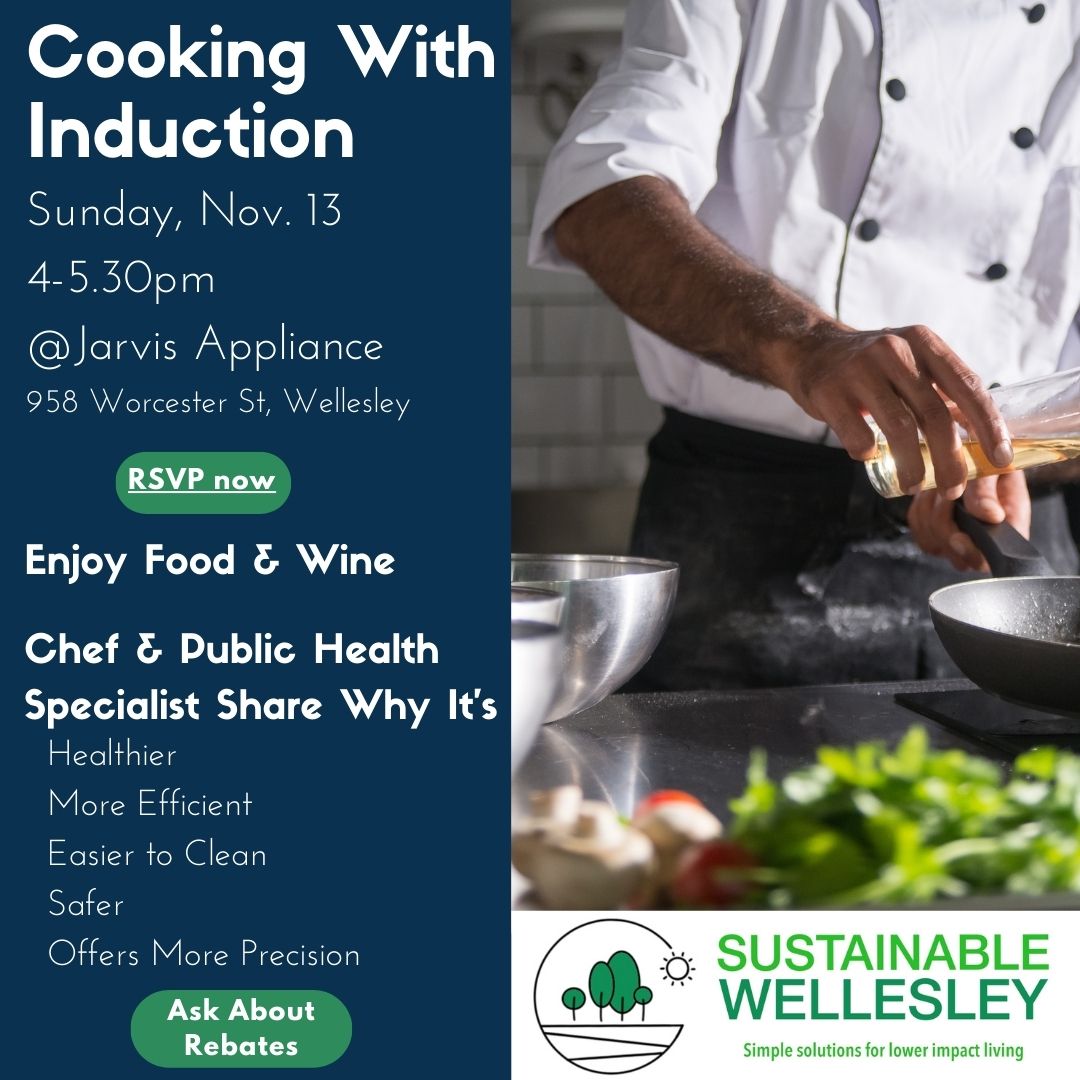
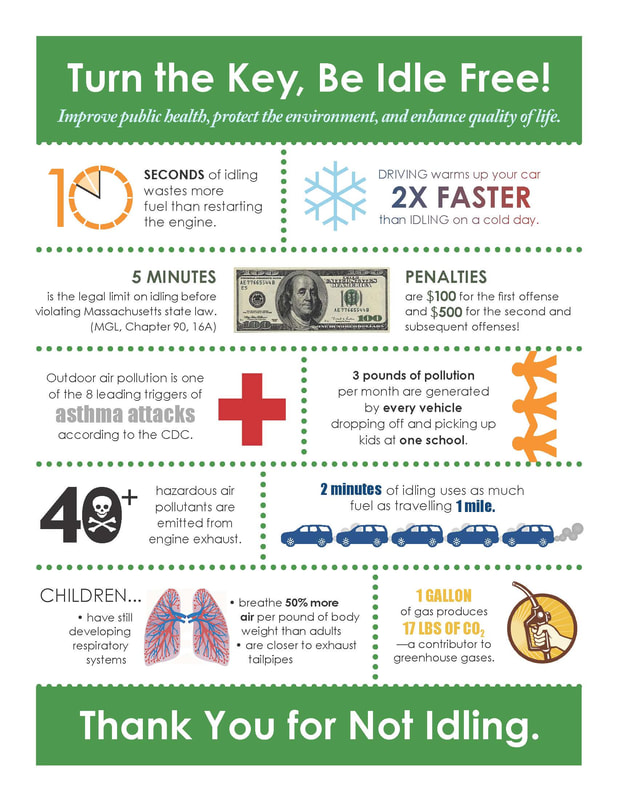
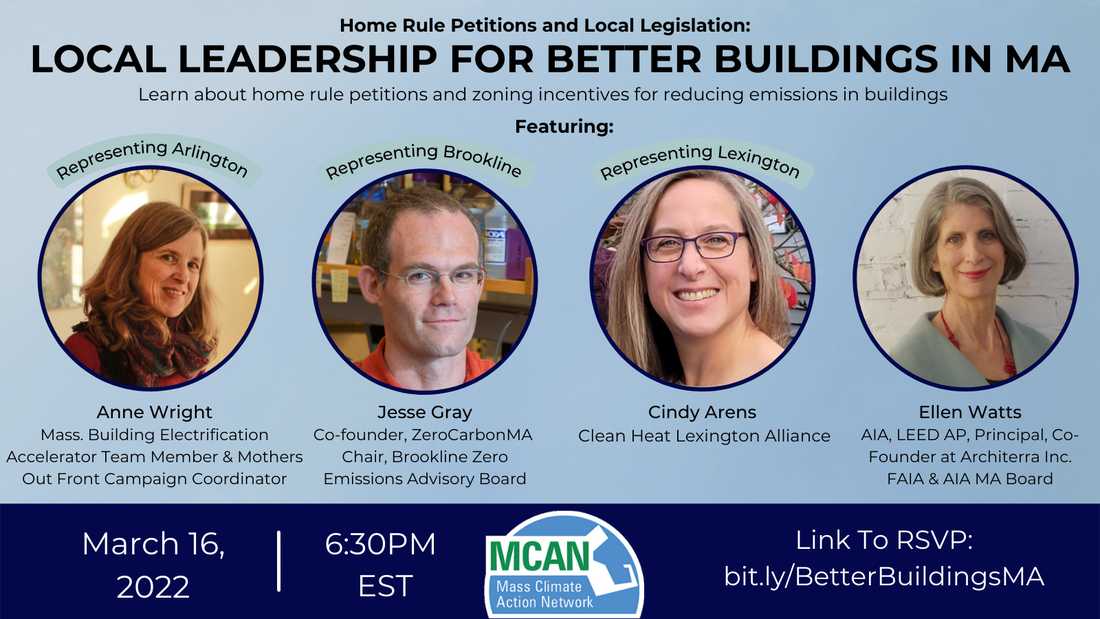


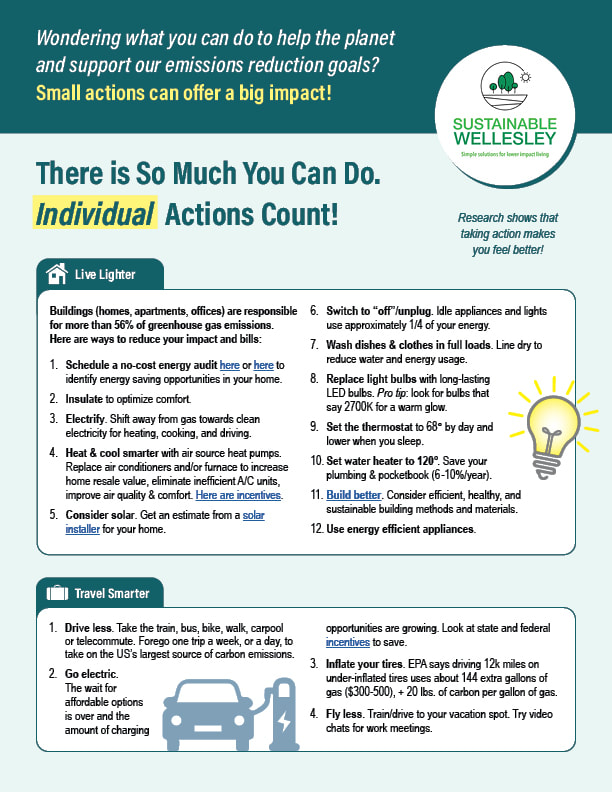

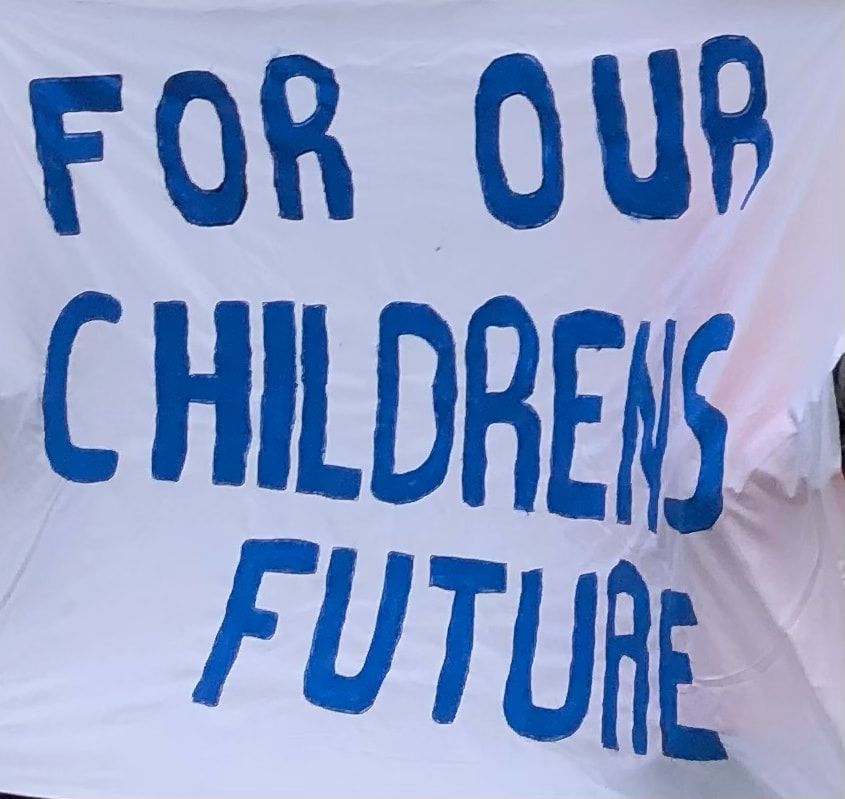
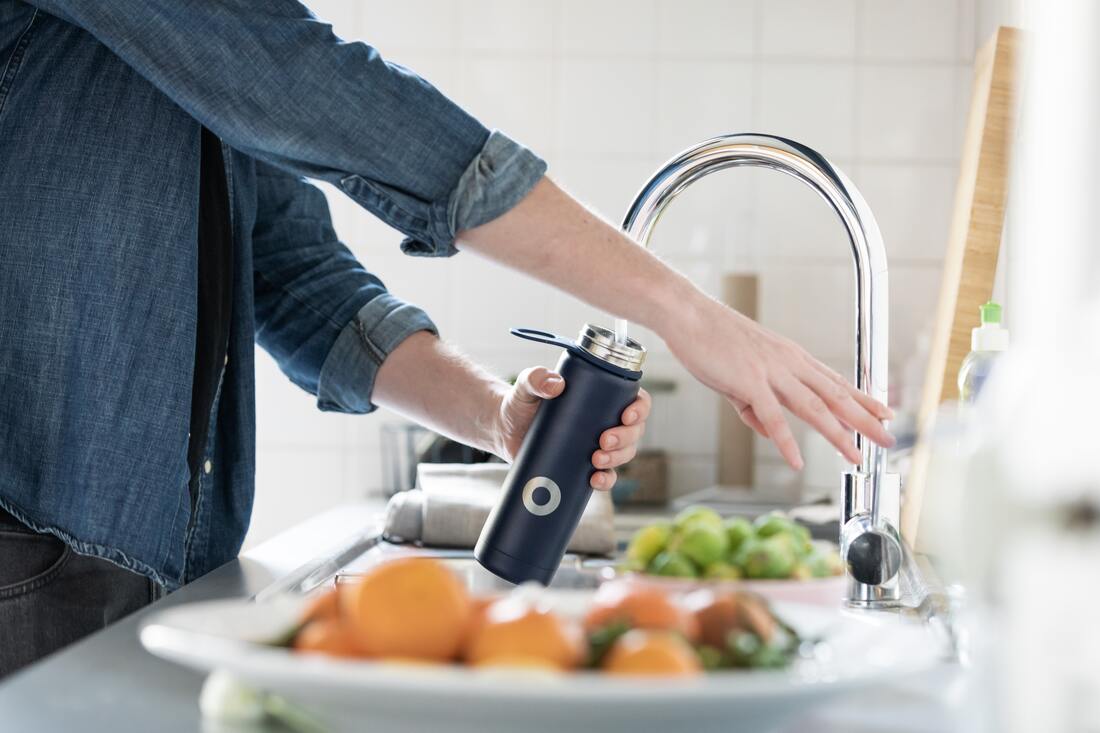

 RSS Feed
RSS Feed